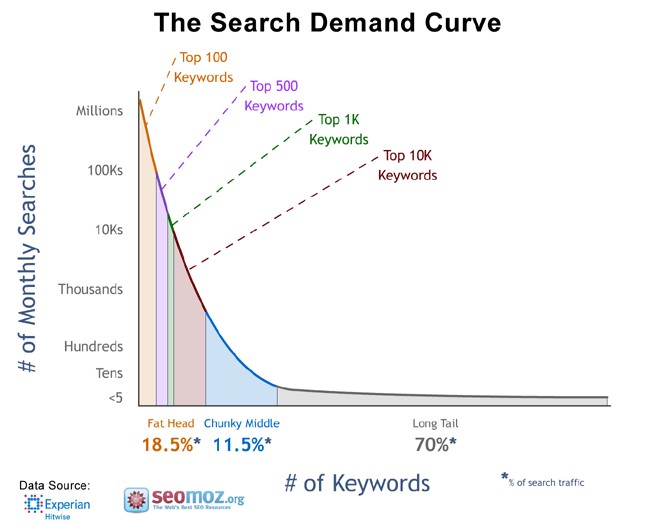I've introduced the topic of creating a strategy around your keywords in a blog post before, but today I'm going to drill down deeper into the concept of long tail keywords and the search demand curve.
The concept of choosing less competitive keywords and not just going after the more popular ones may seem odd, but the practice can benefit your search engine rankings to make it worthwhile.
Here's how it works.
General keywords such as “insurance” or “lawyer” are very popular and therefore have many thousands of companies chasing those keywords to get ranked on the first page. This makes the keyword very competitive, making it harder for you to rank well for them in search engine results.
Some of these popular keywords may have more than 10,000 searches a day worldwide, and some may have 200 searches a day. However, here's the interesting point, these popular search terms only make up less than 30% of the total number of searches performed on the web.
If you are a small- or medium-sized business, you probably won't have the SEO or Adwords budget to go for these popular keywords, so we recommend choosing less competitive keywords or keyword phrases, more specifically related to your business (these are commonly referred to as long tail keywords).
Long tail keywords account for the other 70% of keyword searches on the web. Long tail keywords contains hundreds of millions of unique searches that might be conducted a few times in any given day, but, when taken together, comprise the majority of the world's search volume.
And what makes long tail keywords really worth your while to go after for Inbound Marketing, is that they often convert better, because they catch people later in the buying/conversion cycle, and you're addressing their specif search needs bang on.
A person searching for "insurance" is probably browsing, and not ready to buy, but someone searching for "small business insurance pricing" practically has their credit card handy!
Take a look at the search demand curve illustrated above. It shows the small number of queries sending larger amounts of traffic alongside the volume of less-searched terms and phrases that bring the bulk of our search referrals.
Essentially long tail keywords are 3 words or more and this type of keyword targeting is an excellent SEO strategy to increase traffic to your website.
- Long tail search traffic will generally convert better as buyers are later in the buying cycle. For example a search for "corporate lawyer" would be a general search, where as "corporate lawyer SLA contract" shows the searcher has a more specific intent.
- Long tail keywords are also much easier to rank well with the search engines. A quick look at the results for "small business insurance pricing" shows less competition than "insurance". There may be a lower number of searches, but isn't it better to pay for clicks that are closer to conversion and buying?
Forget about ranking #1 for your Top 100 keywords and instead focus on long tail keywords that will really convert into leads and sales for your business.
Long-tail SEO is more about content marketing and creating valuable, niche content that naturally attracts long-tail search. At the same time, this rich content draws long-tail anchor text and links. The days of just optimizing a site for a couple of keywords are over.
About Terry Marketing
Terry Marketing (www.terrymarketing.com) is an Inbound Marketing Agency providing Inbound Marketing Services to small and medium sized businesses. We're focused on generating traffic, leads and sales and we're experts in the Inbound Marketing, lead generation process and how to increase website traffic, leads and website conversion rates. Terry Marketing is a Hubspot Partner, a certified HootSuite Ambassador agency, and is a certified Google Partner.
 David Terry is CEO of Terry Marketing and Professor of Internet Marketing at Laurentian University. He has a deep knowledge in all aspects of Inbound Marketing, the Internet and Web technologies - as well as an understanding of the importance of how branding, marketing strategy and creative execution can impact business results. You can reach him by phone at 416.204.0255 or email at: david@terrymarketing.com or visit www.terrymarketing.com
David Terry is CEO of Terry Marketing and Professor of Internet Marketing at Laurentian University. He has a deep knowledge in all aspects of Inbound Marketing, the Internet and Web technologies - as well as an understanding of the importance of how branding, marketing strategy and creative execution can impact business results. You can reach him by phone at 416.204.0255 or email at: david@terrymarketing.com or visit www.terrymarketing.com


